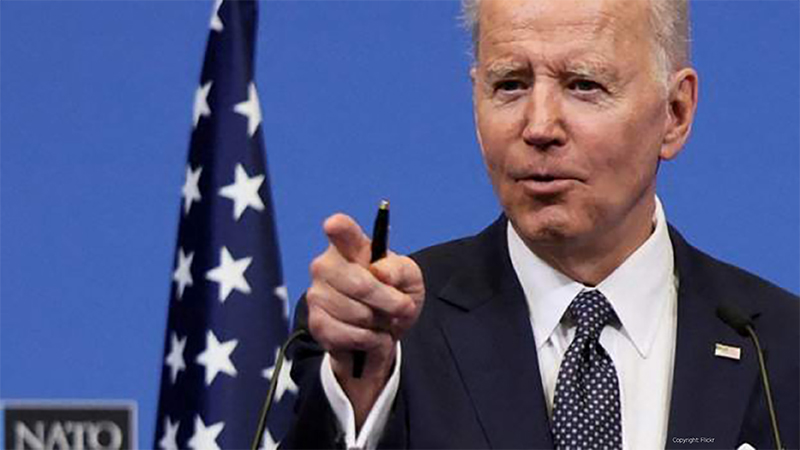In a legislative triumph for US president Joe Biden (pictured), the Inflation Reduction Act passed last week. It contained a package of measures to repay America’s burgeoning government debt, tackle the climate emergency and reduce healthcare costs. However, it comes at a fragile time for the US economy, which teeters on the brink of recession. What is its likely economic impact?
The pressures facing the US economy are myriad. The latest GDP report shows that the country is in a technical recession, having shown two quarters of negative growth, though this is not the measure of an official recession for the country. Low levels of business investment, government spending and inventories are helping drive this weakness.
The labour market and, by extension, the consumer have been areas of relative strength, but are also making it more difficult to tackle the problem.
Steven Bell, director of multi-strategy investments at Columbia Threadneedle, says domestic pressures are far stronger contributory factors to inflation than in the UK and Europe, where energy prices are the main problem.
He adds: “US wages are rising strongly, much, much faster than in Europe and it’s a similar picture for US rents. Recent non-farm payroll figures highlight how strong the US labour market is.”
This makes inflation harder to tackle: “I cannot see a scenario where inflationary pressures are brought under control without a recession. That means the US Federal Reserve has to keep raising rates until it can see a recession is imminent.
“Despite all the doom and gloom, an imminent recession doesn’t seem that likely at the moment, but I think this will all change by year end. My guess is that US interest rates are headed considerably higher.”
See also: Wealth managers batten down the hatches as US enters technical recession
Three-pronged attack on inflation
Will the Inflation Reduction Act do what it says on the tin? Or will it prove inflationary? This is the accusation meted out by the Republican party, who suggest that this is a just another ‘tax and spend’ bill, which will hurt business and raise inflation.
The passing of the bill rested with a single Democratic senator, Joe Manchin, who initially opposed it because he believed it would be inflationary. He only switched when certain amendments were made.
The bill has three main elements: the first is healthcare, with the headline measure being to cap prescription drugs charges at $2,000 for seniors. Half the money raised (around $300bn) will go to pay down the fiscal deficit.
The remaining money will be spent on climate change measures. This includes investment in renewable energy, tax rebates for electric vehicles. There will also be fees imposed for excess methane emissions. Money will be raised by clamping down on tax cheats, some environmental taxes and ensuring corporates pay at least 15% tax.
The Congressional Budget Office is clear that the bill will live up to its name and reduce rather than increase inflation and plenty of respected economists agree.
For example, Joseph E Stiglitz, a Nobel laureate in economics and former chief economist of the World Bank, writes on Project Syndicate: “For those worried about excessive demand, there is more than $300bn in deficit reduction. And on the supply side, the bill would mobilise $369bn of investments in energy security and decarbonisation.
“That will help bring down the cost of energy – one of the main drivers of current price growth – and put America back on track to reduce its carbon dioxide emissions by some 40% (from 2005 levels) by 2030.”
He says the Act will also help address the problem rising healthcare costs, both by lowering Affordable Care Act (dubbed Obamacare) premiums for millions of Americans and by capping out-of-pocket drug costs for those on Medicare.
Healthcare costs have risen 4.8% over the past 12 months, having risen 4.5% in the previous 12 months. This should act to dampen inflation.
Ensuring that corporations and wealthy households pay their fair share of tax should also be deflationary. The bill increases IRS funding by $80bn, which gives the US tax agency the capacity to go after taxes that are owed but unpaid.
For Stiglitz, unpaid tax “not only erodes confidence in our democracy, but also is economically inefficient. Tax revenues are necessary to finance essential public expenditures without generating inflationary deficits”.
It seems likely that the effect of the bill will be at worst neutral and at best, could help curb inflation.
However, these are all long-term measures. It takes time to build the infrastructure to support the energy transition and for the IRS to start collecting taxes due. It will take time before healthcare bills fall and it is felt in the pockets of individual households.
While this long-termism is to be applauded, it does little to curb short-term inflationary threats or drag the US away from recession.
As such, while financial markets have started to hope that a less aggressive stance from the Federal Reserve may be just around the corner, it is difficult to see how this happens.
Certainly, in the short term, the Inflation Reduction Bill is unlikely to move the dial one way or the other.










